Recombinant Human GSK3B Protein, MYC/DDK-tagged
| Cat.No. : | GSK3B-2350H |
| Product Overview : | Recombinant human GSK3B protein, fused to MYC/DDK-tagged at C-terminus, was expressed in HEK293 |
- Specification
- Gene Information
- Related Products
- Case Study
- Application
- Download
| Species : | Human |
| Source : | HEK293 |
| Tag : | DDK&Myc |
| Description : | The protein encoded by this gene is a serine-threonine kinase, belonging to the glycogen synthase kinase subfamily. It is involved in energy metabolism, neuronal cell development, and body pattern formation. Polymorphisms in this gene have been implicated in modifying risk of Parkinson disease, and studies in mice show that overexpression of this gene may be relevant to the pathogenesis of Alzheimer disease. Alternatively spliced transcript variants encoding different isoforms have been found for this gene.[provided by RefSeq, Sep 2009] |
| Form : | 25 mM Tris.HCl, pH 7.3, 100 mM glycine, 10% glycerol. |
| Molecular Mass : | 47.9 kDa |
| Purity : | > 80% as determined by SDS-PAGE and Coomassie blue staining |
| Concentration : | >50 ug/mL as determined by microplate BCA method |
| Gene Name | GSK3B glycogen synthase kinase 3 beta [ Homo sapiens ] |
| Official Symbol | GSK3B |
| Synonyms | GSK3beta isoform; glycogen synthase kinase-3 beta; glycogen synthase kinase 3 beta |
| Gene ID | 2932 |
| mRNA Refseq | NM_001146156 |
| Protein Refseq | NP_001139628 |
| MIM | 605004 |
| UniProt ID | P49841 |
| ◆ Recombinant Proteins | ||
| GSK3B-2382R | Recombinant Rat GSK3B Protein, His (Fc)-Avi-tagged | +Inquiry |
| GSK3B-3085H | Recombinant Human GSK3B Protein, His (Fc)-Avi-tagged | +Inquiry |
| GSK3B-2129H | Recombinant Human GSK3B Protein (1-420 aa), His-tagged | +Inquiry |
| GSK3B-2997H | Recombinant Human GSK3B protein, His-tagged | +Inquiry |
| GSK3B-2728R | Recombinant Rat GSK3B Protein | +Inquiry |
| ◆ Cell & Tissue Lysates | ||
| GSK3B-534MCL | Recombinant Mouse GSK3B cell lysate | +Inquiry |
| GSK3B-717HCL | Recombinant Human GSK3B cell lysate | +Inquiry |
Case 1: Wei G, et al. Aging (Albany NY). 2020
Salidroside, a key compound in Rhodiola rosea, has various bioactivities, but its impact on platelet function is unknown. This study aimed to explore this effect. Platelets from humans or mice were exposed to salidroside (0-20 μM) for an hour and then assessed for aggregation, secretion, receptor expression, spreading, and clot retraction. Mice were also given salidroside (20 mg/kg) intraperitoneally to study bleeding time and thrombosis.
Researchers found that salidroside reduced thrombin- or CRP-triggered platelet aggregation and ATP secretion without affecting the levels of P-selectin, GP Ibα, GPVI, and αIIbβ3. Platelet spreading on fibrinogen or collagen and clot retraction were decreased in salidroside-treated samples, along with lowered phosphorylation of c-Src, Syk, and PLCγ2. Salidroside also impaired hemostasis and thrombus formation in mice. Furthermore, it inhibited AKT and GSK3β phosphorylation in platelets stimulated with thrombin. The addition of a GSK3β inhibitor negated salidroside's inhibitory effects on platelet aggregation and clot retraction.
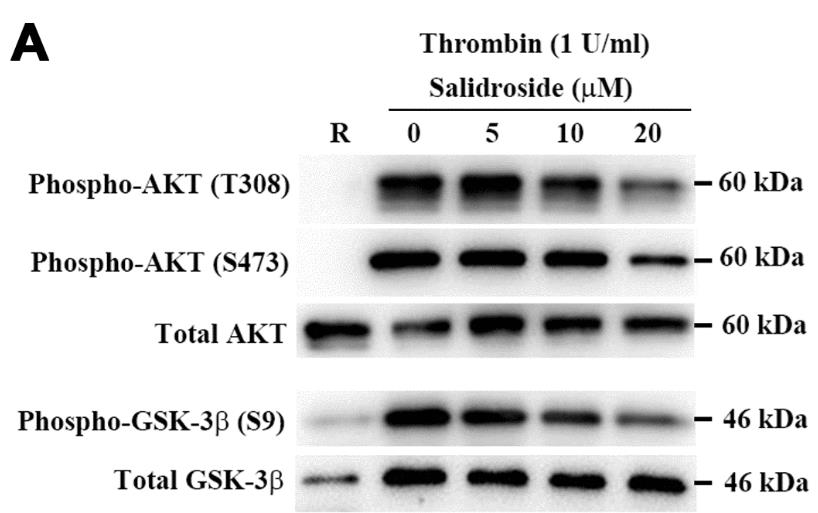
Fig1. After salidroside and thrombin treatment, the phosphorylation level of AKT and GSK3β was performed by western blot.
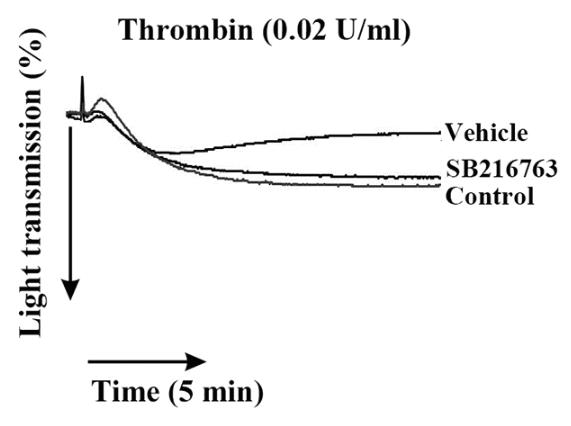
Fig2. After GSK3β inhibitor and salidroside treatment, platelet aggregation in response to thrombin was performed.
Case 2: Li L, et al. Mol Med Rep. 2020
Cholangiocarcinoma (CCA) is a prevalent and aggressive bile duct cancer that is challenging to detect early and resistant to standard treatments. This study explored how GSK‑3β signaling affects the response of CCA cells to doxorubicin (Dox). The results that inhibiting GSK‑3β increased CCA cells' sensitivity to Dox, leading to greater apoptosis, reduced AKT and FAK activity. Treatment with GSK‑3β inhibitors or RNA interference similarly reduced FAK and AKT phosphorylation and boosted Dox-induced apoptosis. Additionally, FAK inhibition reduced AKT activity without involving phosphoinositide 3‑kinase.
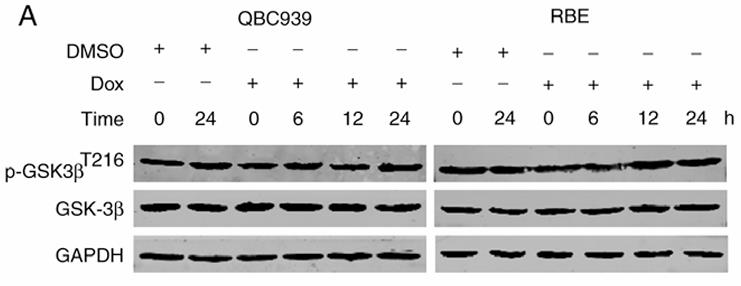
Fig1. GSK-3β inhibition promotes dox-induced apoptosis in human cholangiocarcinoma cells.
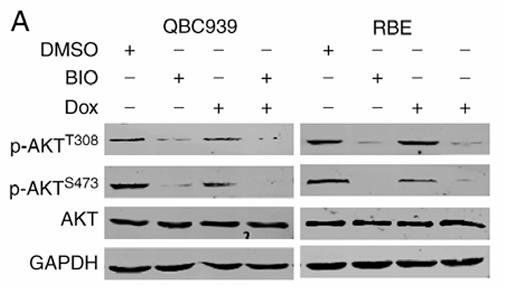
Fig2. GSK-3β inhibition suppresses aKT signaling in human cholangiocarcinoma cells.
GSK3B is a multifunctional serine/threonine kinase involved in the regulation of key cellular processes such as cell proliferation, differentiation, apoptosis and metabolism. GSK3B is an important research target for studying cell signaling, cell cycle control, neurodevelopment, and disease mechanisms.
Due to its role in a variety of cellular processes, GSK3B has become a potential target for drug development. Particularly in the field of cancer therapy, GSK3B inhibitors, as small molecule compounds capable of regulating key signaling pathways, are being extensively investigated in order to develop new anticancer drugs. GSK3B inhibitors can interfere with key signaling pathways such as Wnt/ beta-catenin, PI3K/AKT, and NF-κB, which play an important role in tumor growth, invasion, angiogenesis, and metastasis.
In addition, GSK3B is considered a potential target for the treatment of a variety of diseases, including metabolic diseases, neurodegenerative diseases, and cancer. The recombinant GSK3B protein can be used in high-throughput screening experiments to help discover and develop small molecule drugs that can regulate its activity.
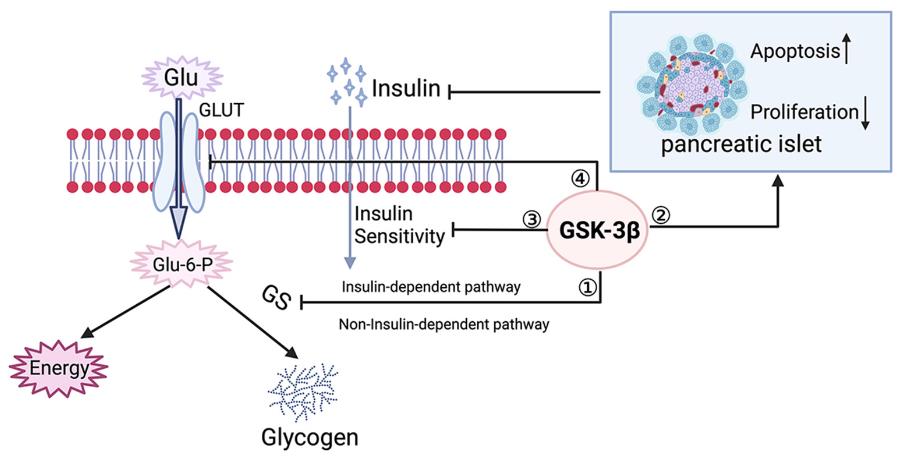
Fig1. The role of GSK3B in glucose metabolism. (Lu-Lu Liang, 2024)
Not For Human Consumption!
Inquiry
- Reviews (0)
- Q&As (0)
Ask a Question for All GSK3B Products
Required fields are marked with *
My Review for All GSK3B Products
Required fields are marked with *



